Member Spotlight: Emily Akoth
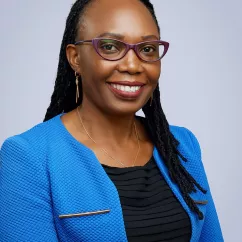
Emily is the Gender and Inclusion Specialist at Access to Finance Rwanda (AFR). She has extensive experience in human rights-based approaches to programming with a technical background in gender, women’s empowerment, youth, climate change, governance, and social accountability. She is highly experienced in developing gender-responsive policies, gender mainstreaming strategies, and strategic plans. Emily is adept at assessing the gender needs of a project and devising innovative strategies to effectively address those needs through gender mainstreaming, public policy influencing, and capacity building. She drew her experience from working with various international and national NGOs, Civil Society Organisations, and the Private Sector in the East African Region and beyond. Emily is a Ph.D. Research Scholar at Africa International University on Leadership and Governance.
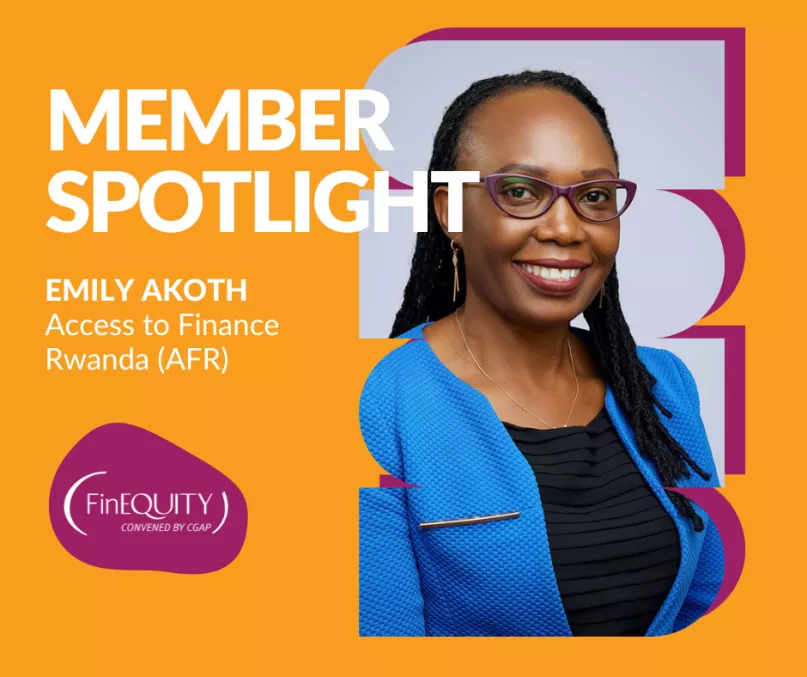
Emily Akoth, Gender and Inclusion Specialist for Access to Finance Rwanda (AFR) sat down with us to discuss how social norms influence the financial behavior of women and market actors, the importance of designing women-centric products and services, influencing market actors to think responsively about the needs of women and much more.
FinEquity: Tell us a little bit about yourself. A fun fact? Something that might surprise most people. Your superpower?
Emily Akoth: My name is Emily, and I have been working as the Gender and Inclusion Specialist for Access to Finance Rwanda (AFR) since November 2021. As the gender technical advisor, I support AFR, implementing partners, and stakeholders to understand and adopt gender transformative best practices that enhance the financial inclusion of not only women but other underserved segments (like youth and persons with disabilities) and sectors (like MSMEs and agriculture). I joined at the beginning of a new phase for the organization, and as such have been able to ensure gender, and in particular issues of women, are integrated into pillar strategies, diagnostic studies, and project designs that will enhance women’s financial inclusion and economic empowerment.
What may surprise many people is that I played hockey for the Kenya National team representing the country in regional games. I have long since retired from active hockey and now enjoy singing and dancing to good music. My superpower is my ability to connect with different cultures and assimilate with ease.
FinEquity: What originally drew you to the women’s financial inclusion (WFI) and economic empowerment (WEE) sector? What has kept you here?
Emily: My desire to work in WFI and WEE goes all the way back to when I was in elementary school. I went to school in a rural community that did not value girls and women and subjected them to harmful cultural practices that exposed them to abuse and exploitation, thus hindering them from developing and achieving their potential. From these experiences, my passion for women’s empowerment was stirred. I shifted my career path to human rights advocacy through empowering women and girls from all regions to combat gender inequalities, and challenge discriminative policies and practices toward gender equality and a transformative approach.
I have been exposed to situations where women’s well-being was (and still is) governed by patriarchal beliefs and customary laws which often prevent women and girls from accessing essential development services – particularly education, health, economic opportunities, land rights, and property ownership – that constrain their economic empowerment and financial inclusion.
In my 15-year career, I have been involved in women’s economic empowerment and advocacy work on ending violence against women and girls, and women in leadership and governance in the East Africa region, particularly Kenya and Rwanda. I successfully mainstreamed gender in various projects from agriculture, education, governance, and climate change sectors among others for regional and international organizations in Kenya, Rwanda, Sweden, Switzerland, and Norway. However, I realized the missing factor in improving women’s status and well-being is financial inclusion. Financial inclusion is a powerful tool and has been seen as an enabler to overcome poverty and improve the livelihoods of many people, therefore I got a paradigm shift in my efforts and focused on improving women’s financial inclusion through working with financial development agencies and service providers to design women-centric products and services.

Coming to AFR has given me the opportunity to influence market actors to think responsively about the needs of women. I emphasize that women are not a homogenous group and therefore financial services and products should not have a one-size-fits-all but understand their intersectional characteristics and behavior while designing the products and acknowledge the gendered constraints such as time and mobility factors that hinder women from benefitting from them.
The WFI and WEE sector is an interesting space to be in. Working with a market facilitator is different from the advocacy space I had gotten used to. Catalyzing market system change is impactful, and I ensure that the market is gender sensitive and responsive to the needs of the underserved or unserved segments. It requires passion, resilience, and most importantly creativity and innovation. I have been strategically working and developing my own skills to effectively deliver exceptional results for improving women’s financial inclusion while developing a strong culture that is gender-responsive. I am currently writing my Ph.D. dissertation on political economy analysis to more deeply understand how to incentivize market actors to prioritize women’s financial inclusion.
FinEquity: Any current projects you’re working on that you’re finding particularly exciting/engaging?
Emily: My role and responsibilities are well-aligned with gender mainstreaming and inclusion. For instance, I have been coordinating the Social Norms Diagnostics and its impact on women’s financial inclusion in Rwanda. This study has exposed me to new insights on not only understanding the Rwandan culture but how social norms influence the financial behavior of women and market actors. At AFR, women are an integral part of the overall strategy to support inclusive economic growth in Rwanda, and my responsibility is to provide guidance on how AFR can champion gender mainstreaming in all its projects and actions.
Rwanda scores high on the Global Gender Equality index and has a very small gender gap in access to finance – just 1% (Finscope, 2020).
The reality, however, is that women still do not benefit from financial services in the same way as men, especially when it comes to formal financial services. This is especially true for women entrepreneurs who are credit-constrained and unable to grow their businesses, and still depend on the informal sector. All these things imply that there is something deeper that is creating constraints for women – likely, the gender norms. This diagnostic study has provided me with the opportunity to explore why women entrepreneurs are not using financial services. As a result of this study, AFR has been cognizant of the restrictive gender norms that cause persistent gender inequality in the financial market system, and in our work, we have designed social norms-informed interventions to facilitate market systems change.
"The reality, however, is that women still do not benefit from financial services in the same way as men, especially when it comes to formal financial services."
FinEquity: Do you have a success story from your work with AFR you’d like to share? (An occasion where you felt that you or your organization were making a real impact in the lives of women?)
Emily: I have greatly contributed to AFR project design by ensuring each project gives a focus on women’s specific financial needs. For instance, AFR has supported the implementation of a wide range of projects targeting sectors that are dominated by women. Through a sustainable linkage model, we supported the digitization of Village Savings and Loans Associations (VSLAs) to allow them to use formal financial services and products and benefit from the linkages by having renumerated savings accounts and access to larger loans than what they normally get from their savings groups, which of course increases their revenues.
As a follow-up to this success, we are rolling out phase two of the Rwanda National Digital Payment System project to provide interoperability solutions that will support in removing challenges of access and usage for women and provide solutions that will be available in the market, and they can access wherever they are. This project will ensure underserved segments, especially women benefit through:
- Gender intentionality in the design of a wider range of digital financial products and services that are affordable and tailored to their needs.
- Improved access to financial services through convenient, readily available digital channels.
- A reduced gender gap in DFS inclusion by promoting transformative measures such as prioritization of women and collecting data on multiple gender-disaggregated metrics that may be used to close the gender gap.
- Greater utility of a financial account to store and spend funds digitally and at low cost, among others.
FinEquity: What are your top priorities for the remainder of 2022 (and beyond) for your work?
Emily: My top priority for the remaining part of 2022 is to share insights and learnings from the Social Norms study with different stakeholders from the government, private sector, CSOs, and different civic groups to ensure they not only understand these restrictive gender norms but also integrate into their strategic decisions and actions.
FinEquity: You recently participated in our Co-Lab learning initiative, what was your most impactful takeaway from that experience?
Emily: Yes, I was one of the speakers in the recent FinEquity Webinar on Gender Norms Diagnostics: What are we learning? from Malawi, Bangladesh, and Rwanda. Interestingly, there was commonality in the findings that gender norms play a pivotal role in influencing women’s access to and usage of financial services and control over income across all three countries, though they are different cultures and societies. This implies that patriarchy is deep-rooted and widely spread to the extent that women have become great influencers in upholding these negative and restrictive norms.
Gender norms restrict women’s time and mobility and as such they are unable to access, use and control their income which prevents them from being targeted by financial service providers. Therefore, in promoting women’s financial inclusion, it is important to address the negative patriarchal systems that restrict effectiveness and impactful financial inclusion interventions.
Market system change can only happen if these systemic ideologies impacted by gender norms are transformed. It is not just targeting the supply-side and regulations, but also transforming how the women and men within a community can transform their behavior in a manner that promotes women’s access to and use of financial services and control over their income.
"Therefore, in promoting women’s financial inclusion, it is important to address the negative patriarchal systems that restrict effectiveness and impactful financial inclusion interventions."
FinEquity: What can our members connect with you about/what can they ask you about?
Emily: I’m always open to collaboration, particularly in mainstreaming gender peer review, experiential learning forums, research designs, co-writing insights, and participating in forums/events. I can be reached at emily@afr.rw or connect with me on LinkedIn (Emily Akoth Okongo).
FinEquity: What role does FinEquity play in your work? Where do you see value in this community? How has being a member shaped your work?
Emily: FinEquity plays a very key role. The regular webinars on different themes provide me with new perspectives, ideas, and insights that improve my role as a gender and inclusion advisor in market system development. The monthly features are great for sharing learnings and current status, and innovations in the sector which keep me, and many others updated on market trends. It also provides a collaborative forum and platform which expands our network, making us a global movement in financial inclusion.
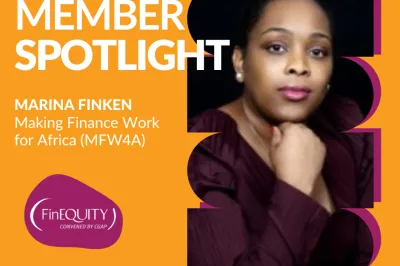
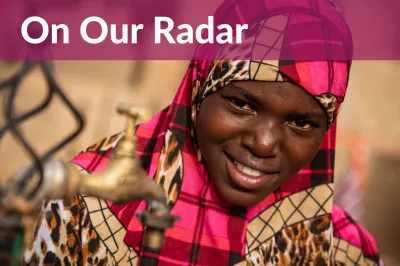
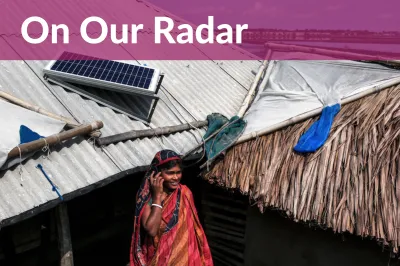
Wow this is indeed great. I've always admired your excellence... For sure you're an inspiration to many women out there. I'm proud of you and congratulations for your achievement
Wow Great work and keep on going
Very informative article, and great job Emily
Such empowering message?.
Wow Wow congratulations dear so proud of you!!
Great job keep the fire burning
This is amazing and I am very proud of your achievements. Well done!
Good
Wow?. Congratulations ??
Emily is a modern day hero
Leave a comment